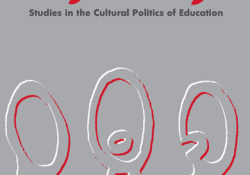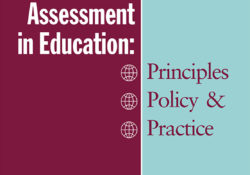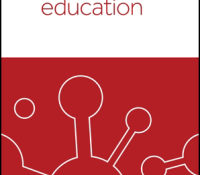tandfonline.com har udgivet en rapport under søgningen “Teacher Education Mathematics”: ABSTRACT ABSTRACT This paper analyzes the impact of a Course Transformation process based on a Flipped Classroom strategy on Chilean Engineering students’ attitudes toward university-level mathematics. The Attitudes Toward Mathematics Inventory (ATMI) questionnaire was applied as both pre- and post-test to 76 students in three mathematic courses (Calculus I, Calculus II and Elements of Algebra for Computing) at Universidad Católica de Temuco’s Faculty of Engineering which adopted a flipped classroom method. The results showed a significant positive change in the perceived value of mathematics in the four ATMI categories (P < 0.05) with different effect sizes after the implementation of the flipped classroom and active learning strategies. The results suggest that the implementation of transformed courses using a Flipped Classroom method has a… Continue Reading →
Like this:
Like Loading...

tandfonline.com har udgivet en rapport under søgningen “Teacher Education Mathematics”: ABSTRACT ABSTRACT What are the current challenges and opportunities for bringing actor-network theory (ANT) into issues-based science education? This article discusses experiences gained from introducing an educational version of ANT deploying digital technology into an upper secondary school science class. This teaching innovation, called controversy mapping, has been pioneered in different contexts of higher education before being adapted to school education. Experimenting with controversy mapping in a Swedish science class raised both conceptual and practical issues. These centre on: (1) how ANT-inspired controversy mapping redesigns the citizenship training enacted by institutionalized approaches to issues-based education as socioscientific issues (SSI); (2) how controversy mapping reconfigures the interdisciplinarity of issues-based science education; and (3) how controversy mapping displaces scientific literacy and knowledge… Continue Reading →
Like this:
Like Loading...
eric.ed.gov har udgivet: In this study a survey instrument was developed to test elementary teachers’ attitudes towards incorporating manipulatives in their math lessons frequently. Though the benefits of using math manipulatives has been reported, there seems to be a disconnect between the benefits of manipulative use and the number of teachers integrating them in their lessons on a daily basis. In this study a total of 22 regular education teachers in kindergarten through sixth grade and five learning support teachers in grades first through sixth from a rural elementary school were given a survey instrument to test its validity and reveal some trends in teachers’ views on manipulative use as well as possible causation for their views. Findings from the study show that though many teachers feel comfortable using and… Continue Reading →
Like this:
Like Loading...
tandfonline.com har udgivet en rapport under søgningen “Teacher Education Mathematics”: Link til kilde
Like this:
Like Loading...
tandfonline.com har udgivet en rapport under søgningen “Teacher Education Mathematics”: Abstract Abstract English language teaching (ELT) as a second or foreign language is a worldwide practice for Educational Systems in elementary schools. Educational reforms in Mexico have aimed at addressing English language learning within the elementary schools’ curricula, however, there have been shortcomings when implementing the teaching of English as a Foreign Language (EFL) in all Mexican classrooms. This study was done to explore the possibility of general classroom teachers becoming EFL facilitators. The participants were 15 general classroom teachers with no specialization in ELT, from either a rural school in a Bilingual indigenous community or an urban school in the Mexican State of San Luis Potosí. A mixed-method research approach was employed, which included a socioeconomic questionnaire, an attitude… Continue Reading →
Like this:
Like Loading...
eric.ed.gov har udgivet: Most states’ teacher evaluation systems have changed substantially in the past decade. New evaluation systems typically require school leaders to observe teachers’ classrooms two to three times a school year instead of once (Doherty & Jacobs, 2015). The feedback that school leaders provide to teachers after these observations is a key but understudied step in the teacher evaluation cycle. The feedback and subsequent professional development are intended to help teachers change their instructional practices and improve student achievement (Correnti & Rowan, 2007; DeNisi & Sonesh, 2011; Taylor & Tyler, 2012). However, little is known about the feedback that school leaders provide to teachers following classroom observations or about how to train leaders to make that feedback more effective. This study examined the impact of disseminating a detailed… Continue Reading →
Like this:
Like Loading...
eric.ed.gov har udgivet: In this study, it is aimed to examine the effect of classroom assessment on science and mathematics achievements. For this purpose, hierarchical linear modeling (HLM) is performed using variables of like learning science/maths, engage teaching in science/maths, confidence in science/maths, and home resources for learning variables at the student level, and experience, education level, homework, and assessment at the teacher level. The sample of the study consists of 4th grade students who participated in TIMSS 2015 in Turkey. According to the findings; 36% of variance in science achievement, and 40% of variance in mathematics achievement are due to variability between classes. In a random coefficient model, all student variables were found to be statistically significant predictors of science and mathematics achievement. Among these variables, the greatest effect… Continue Reading →
Like this:
Like Loading...
tandfonline.com har udgivet en rapport under søgningen “Teacher Education Mathematics”: ABSTRACT ABSTRACT Classroom formative assessment (CFA) is considered to be a fundamental part of effective teaching, as it is presumed to enhance student performance. However, there is only limited empirical evidence to support this notion. In this effect study, a quasi-experiment was conducted to compare 2 conditions. In the treatment condition, 17 teachers implemented a CFA model containing both daily and weekly goal-directed instruction, assessment, and immediate instructional feedback for students who needed additional support. In the control condition, 17 teachers implemented a modification to their usual practice. They assessed their students’ mastery of learning goals on the basis of half-yearly mathematics tests, and prepared weekly pre-teaching sessions for groups of low-achieving students. The posttests showed no significant differences in… Continue Reading →
Like this:
Like Loading...
eric.ed.gov har udgivet: Previous research suggests that there are academic benefits when students and teachers share the same race/ethnicity because such teachers can serve as role models, mentors, advocates, or cultural translators. In this paper, we obtain estimates of achievement changes as students are assigned to teachers of different races/ethnicities from grades 3 through 10 utilizing a large administrative dataset provided by the Florida Department of Education that follows the universe of test-taking students in Florida public schools from 2001-02 through 2008-09. We find small but significant positive effects when black and white students are assigned to race-congruent teachers in reading (0.004 to 0.005 standard deviations) and for black, white and Asian/Pacific Island students in math (0.007 to 0.041 standard deviations). We also examine the effects of race matching by… Continue Reading →
Like this:
Like Loading...
eric.ed.gov har udgivet: This paper attends to teacher intellectual risk-taking when attached to expression of positive emotions, in order to explore some of the reasons why teacher risktaking may not appear in mathematics lessons. We know that risk-taking can be beneficial, but research has not really examined what form this might take in a classroom. In recent research, I investigated how positive emotions are discussed and used by experienced mathematics teachers. In particular how to examine the ‘in-the-moment’ emotions of the teacher, and what the modelling of experienced teachers tells us about the role of affect in mathematics teaching. This paper examines some affect episodes for elements of teacher risk-taking. The evidence suggests that teacher risk-taking enables the use of emotions, and vice versa, is integral to ‘good’ teaching, and… Continue Reading →
Like this:
Like Loading...




